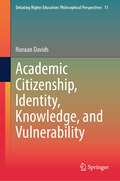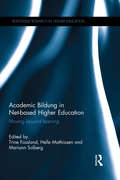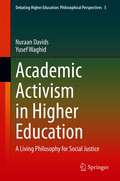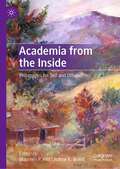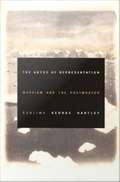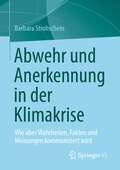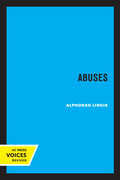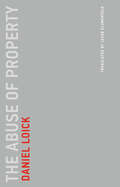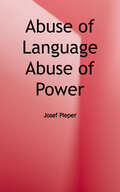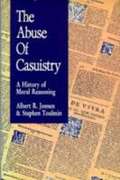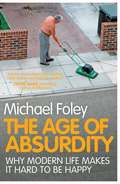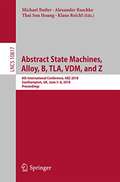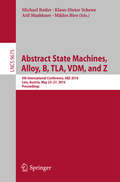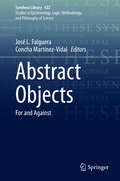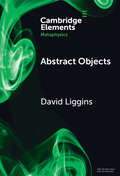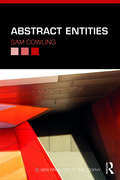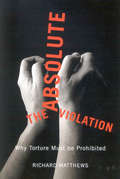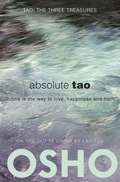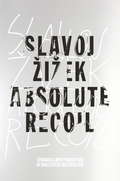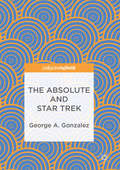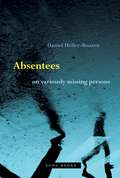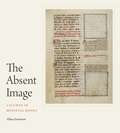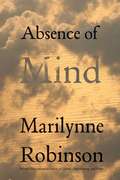- Table View
- List View
Academic Citizenship, Identity, Knowledge, and Vulnerability (Debating Higher Education: Philosophical Perspectives #11)
by Nuraan DavidsThis book brings into contestation the idea of academic citizenship as a homogenous and inclusive space. It delves into who academics are and how they come to embody their academic citizenship, if at all. Even when academics hold similar professional standings, their citizenship and implied notions of participation, inclusion, recognition, and belonging are largely pre-determined by their personal identity markers, rather than what they do professionally. As such, it is hard to ignore not only the contested and vulnerable terrain of academic citizenship, but the necessity of unpacking the agonistic space of the university which both sustains and benefits from these contestations and vulnerabilities.The book is influenced by a postcolonial vantage point, interested in unblocking and opening spaces, thoughts, and voices not only of reimagined embodiments and expressions of academic citizenship but of hitherto silenced and discounted forms of knowledge and being. It draws on academics' stories at various universities located in South Africa, USA, UK, Hong Kong, and the Philippines. It steps into the unexplored constructions of how knowledge is used in the deployment of valuing some forms of academic citizenship, while devaluing others. The book argues that different kinds of knowledge are necessary for both the building and questioning of theory: the more expansive our immersion into knowledge, the greater the capacities and opportunities for unlearning and relearning.
Academic Bildung in Net-based Higher Education: Moving beyond learning (Routledge Research in Higher Education)
by Trine Fossland Helle Mathiasen Mariann SolbergThe explosive emergence of net-based learning in higher education brings with it new possibilities and constraints in teaching and learning environments.This edited collection considers how the concept of Academic Bildung - a term suggesting a personal educational process beyond actual educational learning - can be applied to net-based higher education. The book is drawing on Scandinavian research to address the topic from both a theoretical and practical standpoint.Chapters explore the facilitation of online courses and argue how and why universities should involve dimensions of Academic Bildung on both a strategic and technological pedagogical content level. The book is structured in three parts: Part I frames the current state of net-based learning and introduces Bildung as a concept; Part II contains a set of four case studies in Norway, Sweden and Denmark, also including a fifth study that looks at Scandinavian approaches to teaching and learning in comparison with data from the USA, the UK, Australia and Canada; Part III provides a synthesis of theories and cases to examine whether a Scandinavian orientation can be discerned. Contributions suggest that in order to address one of the fundamental functions of higher education, the ability to produce new knowledge, the Academic Bildung of the students has to be in focus. Grounded in theoretical and empirical discussion, this book will appeal to researchers and academics in the field of higher education as well as personnel who work with teaching and learning with technology, and academics interested in the question of Academic Bildung.
Academic Activism in Higher Education: A Living Philosophy for Social Justice (Debating Higher Education: Philosophical Perspectives #5)
by Nuraan Davids Yusef WaghidThis book argues for renewed understandings of academic activism, understandings that conceive of the ideas, arguments and scholarship of the academe as embedded within the practices of what the academy does. It examines why and how a renewed notion of academic activism informs a philosophy of higher education specifically in relation to teaching and learning. The book focuses on the theories and practices of teaching and learning, in particular how such pedagogical actions are guided by social, political and cultural influences outside of the university as a higher education institution. The authors advocate for a living philosophy of higher education that is commensurate with real actions and imaginary fictions of what constitutes higher education and what remains in becoming for the discourse. With a focus on South African social justice education, the book imagines pathways for academic activism to manifest in revolutionised pedagogical actions or actions that bring into contestation what already exists with the possibility for the cultivation of renewal.
Academia from the Inside: Pedagogies for Self and Other
by Maureen P. Hall Aubrie K. BraultThis book invites readers to explore how fourteen different experts in their respective fields create deeper meaning in their profession and work with students through thinking, in multiple ways, about the self who teaches, the self who learns, and the ways in which these selves interact within the academy. Essays in this book explore the “inside” of academia through three themes: Pursuing Authenticity, Creating Creative Community, and Humanizing Education. Contributors reflect on their own lived experiences in the academy and on pedagogies that they have created for their students. Embodied education, the theoretical framework of this book, draws on ideas of educators Parker Palmer from the West and Dr. Chinmay Pandya from the East, emerging through contributors’ collaborative work. In embodied education, teachers and learners share experiences that lead to self-understanding and together find ways to humanize spaces in academia.
Academia and the World Beyond: Navigating Life after a PhD
by Christopher R. MadanA common question posed to PhD students from friends and family is, “What will you do after?” But many students are too focused on the PhD itself and have not yet had a chance to sufficiently think about post-PhD life. This book is a collection of 22 interviews with those have completed a PhD and then are now in an academic position or another career path. In either case, they have all been successful and have a multitude of insights to share with those who are interested in considering a variety of careers. Academic careers share many commonalities with many non-academic careers, with skills learned within academia being valuable in other career paths as well. Nearly all the individuals interviewed here have been on the job market recently and understand today's job climate. No other book on the market includes the diversity of perspectives presented here. In particular, the focus on psychology and neuroscience draws from a variety of individuals that have similar training but have nonetheless taken divergent paths.
The Abyss of Representation: Marxism and the Postmodern Sublime
by George HartleyFrom the Copernican revolution of Immanuel Kant to the cognitive mapping of Fredric Jameson to the postcolonial politics of Gayatri Chakravorty Spivak, representation has been posed as both indispensable and impossible. In his pathbreaking work, The Abyss of Representation, George Hartley traces the development of this impossible necessity from its German Idealist roots through Marxist theories of postmodernism, arguing that in this period of skepticism and globalization we are still grappling with issues brought forth during the age of romanticism and revolution. Hartley shows how the modern problem of representation--the inability of a figure to do justice to its object--still haunts today's postmodern philosophy and politics. He reveals the ways the sublime abyss that opened up in Idealist epistemology and aesthetics resurfaces in recent theories of ideology and subjectivity. Hartley describes how modern theory from Kant through Lacan attempts to come to terms with the sublime limits of representation and how ideas developed with the Marxist tradition--such as Marx's theory of value, Althusser's theory of structural causality, or Zizek's theory of ideological enjoyment--can be seen as variants of the sublime object. Representation, he argues, is ultimately a political problem. Whether that problem be a Marxist representation of global capitalism, a deconstructive representation of subaltern women, or a Chicano self-representation opposing Anglo-American images of Mexican Americans, it is only through this grappling with the negative, Hartley explains, that a Marxist theory of postmodernism can begin to address the challenges of global capitalism and resurgent imperialism.
Abwehr und Anerkennung in der Klimakrise: Wie über Wahrheiten, Fakten und Meinungen kommuniziert wird
by Barbara StrohscheinAuf Wahrheiten, Fakten und Meinungen zur Klimafrage wird häufig öffentlich wie privat mit psychischer oder sozialer Abwehr reagiert. Gestützt auf ausgewählte psychologische und philosophische Theorien sowie Datenmaterial wird in diesem Buch gezeigt, wie Abwehr zustande kommt, wie sie wirkt und wie andererseits die notwendige Anerkennung auf verschiedenen Ebenen gelingen kann. Erst durch Anerkennung werden konstruktive Diskurse möglich. Dieses Buch bietet alle Grundlagen, um Kommunikationskonflikte zwischen Abwehr und Anerkennung in der Klimakrise theoretisch und praktisch lösen zu können.
Abuses
by Alphonso LingisPart travelogue, part meditation, Abuses is a bold exploration of central themes in Continental philosophy by one of the most passionate and original thinkers in that tradition writing today. A gripping record of desires, obsessions, bodies, and spaces experienced in distant lands, Alphonso Lingis's book offers no less than a new approach to philosophy—aesthetic and sympathetic—which departs from the phenomenology of Levinas and Merleau-Ponty. "These were letters written to friends," Lingis writes, "from places I found myself for months at a time, about encounters that moved me and troubled me. . . . These writings also became no longer my letters. I found myself only trying to speak for others, others greeted only with passionate kisses of parting." Ranging from the elevated Inca citadel of Machu Picchu, to the living rooms of the Mexican elite, to the streets of Manila, Lingis recounts incidents of state-sponsored violence and the progressive incorporation of third-world peoples into the circuits of exchange of international capitalism. Recalling the work of such writers as Graham Greene, Kathy Acker, and Georges Bataille, Abuses contains impassioned accounts of silence, eros and identity, torture and war, the sublime, lust and joy, and human rituals surrounding carnival and death that occurred during his journeys to India, Bangladesh, Thailand, Bali, the Philippines, Antarctica, and Latin America. A deeply unsettling book by a philosopher of unusual imagination, Abuses will appeal to readers who, like its author, "may want the enigmas and want the discomfiture within oneself." This title is part of UC Press's Voices Revived program, which commemorates University of California Press's mission to seek out and cultivate the brightest minds and give them voice, reach, and impact. Drawing on a backlist dating to 1893, Voices Revived makes high-quality, peer-reviewed scholarship accessible once again using print-on-demand technology. This title was originally published in 1994.
The Abuse of Property (Untimely Meditations #19)
by Daniel LoickA fundamental critique of the current property regime, calling for radical social and political change.In The Abuse of Property, Daniel Loick offers a multifaceted philosophical critique of the concept of property, broadly understood. He argues that property should not be the dominant framework in which human beings regulate the use of things, that property is not the same as use. Property rights, in his view, are not conditions of freedom or justice, but deficient, dysfunctional, and harmful ways of interacting with other people and the natural environment. He dissects not only the classic justifications of property (from John Locke's justification of property as a natural right based on individual freedom to Hegel's justification of property as a form of mutual recognition) but also the classic critiques of property, from Proudhon and Marx up to Adorno and Agamben.Through an innovative critical approach to legal studies, Loick demonstrates how the concept of property, historically applied to things and people and still a linchpin of our distorted relation with the world, forms a direct line from the Occupy movement to Black Lives Matter and beyond.
Abuse of Language, Abuse of Power
by Josef PieperOne of the great Catholic philosophers of our day reflects on the way language has been abused so that, instead of being a means of communicating the truth and entering more deeply into it, and of the acquisition of wisdom, it is being used to control people and manipulate them to achieve practical ends. Reality becomes intelligible through words. Man speaks so that through naming things, what is real may become intelligible. This mediating character of language, however, is being increasingly corrupted. Tyranny, propaganda, mass-media destroy and distort words. They offer us apparent realities whose fictive character threatens to become opaque. Josef Pieper shows with energetic zeal, but also with ascetical restraint, the path out of this dangerous situation. We are constrained to see things again as they are and from the truth thus grasped, to live and to work.
The Abuse of Casuistry: A History of Moral Reasoning
by Albert R. Jonsen Stephen E. ToulminIn this engaging study, the authors put casuistry into its historical context, tracing the origin of moral reasoning in antiquity, its peak during the sixteenth and early seventeenth century, and its subsequent fall into disrepute from the mid-seventeenth century.
Absurdity
by Michael FoleyThe good news is that the great thinkers from history have proposed the same strategies for happiness and fulfilment. The bad news is that these turn out to be the very things most discouraged by contemporary culture. This knotty dilemma is the subject of The Age of Absurdity - a wry and accessible investigation into how the desirable states of wellbeing and satisfaction are constantly undermined by modern life. Michael Foley examines the elusive condition of happiness common to philosophy, spiritual teachings and contemporary psychology, then shows how these are becoming increasingly difficult to apply in a world of high expectations and 'always-on' communications technology. The common challenges of earning a living, maintaining a relationship and ageing are becoming battlegrounds of existential angst and self-loathing in a culture that demands conspicuous consumption, high-octane partnerships and perpetual youth. In conclusion, rather than denouncing and rejecting the age, Foley presents an entertaining strategy of not just accepting but embracing today's world - finding happiness in its absurdity.
Abstract State Machines, Alloy, B, TLA, VDM, and Z: 5th International Conference, Abz 2016, Linz, Austria, May 23-27, 2016, Proceedings (Lecture Notes in Computer Science #9675)
by Michael Butler Atif Mashkoor Miklos Biro Laus-Dieter ScheweThis book constitutes the refereed proceedings of the 5th International Conference on Abstract State Machines, Alloy, B, TLA, VDM, and Z, ABZ 2016, held in Linz, Austria, in May 2016. <P><P> The 17 full and 15 short papers presented in this volume were carefully reviewed and selected from 61 submissions. They record the latest research developments in state-based formal methods Abstract State Machines, Alloy, B, Circus, Event-B, TLS+, VDM and Z.
Abstract State Machines, Alloy, B, TLA, VDM, and Z: 5th International Conference, ABZ 2016, Linz, Austria, May 23-27, 2016, Proceedings (Lecture Notes in Computer Science #9675)
by Michael Butler Klaus-Dieter Schewe Atif Mashkoor Miklos BiroThis bookconstitutes the refereed proceedings of the 5th International Conference on AbstractState Machines, Alloy, B, TLA, VDM, and Z, ABZ 2016, held in Linz, Austria, inMay 2016. The 17 full and 15 short papers presented in this volume were carefullyreviewed and selected from 61 submissions. They record the latest researchdevelopments in state-based formal methods Abstract State Machines, Alloy, B,Circus, Event-B, TLS+, VDM and Z.
Abstract Objects: For and Against (Synthese Library #422)
by José L. Falguera Concha Martínez-VidalThis volume examines the question “Do abstract objects exist?”, presenting new work from contributing authors across different branches of philosophy. The introduction overviews philosophical debate which considers: what objects qualify as abstract, what do we mean by the word "exist” and indeed, what evidence should count in favor or against the thesis that abstract objects exist. Through subsequent chapters readers will discover the ubiquity of abstract objects as each philosophical field is considered.Given the ubiquitous use of expressions that purportedly refer to abstract objects, we think that it is relevant to attend to the controversy between those who want to advocate the existence of abstract objects and those who stand against them. Contributions to this volume depict positions and debates that directly or indirectly involve taking one position or other about abstract objects of different kinds and categories. The volume provides a variety of samples of how positions for or against abstract objects can be used in different areas of philosophy in relation to different matters.
Abstract Objects (Elements in Metaphysics)
by null David LigginsPhilosophers often debate the existence of such things as numbers and propositions, and say that if these objects exist, they are abstract. But what does it mean to call something 'abstract'? And do we have good reason to believe in the existence of abstract objects? This Element addresses those questions, putting newcomers to these debates in a position to understand what they concern and what are the most influential considerations at work in this area of metaphysics. It also provides advice on which lines of discussion promise to be the most fruitful.
Abstract Entities (New Problems of Philosophy)
by Sam CowlingThink of a number, any number, or properties like fragility and humanity. These and other abstract entities are radically different from concrete entities like electrons and elbows. While concrete entities are located in space and time, have causes and effects, and are known through empirical means, abstract entities like meanings and possibilities are remarkably different. They seem to be immutable and imperceptible and to exist "outside" of space and time. This book provides a comprehensive critical assessment of the problems raised by abstract entities and the debates about existence, truth, and knowledge that surround them. It sets out the key issues that inform the metaphysical disagreement between platonists who accept abstract entities and nominalists who deny abstract entities exist. Beginning with the essentials of the platonist–nominalist debate, it explores the key arguments and issues informing the contemporary debate over abstract reality: arguments for platonism and their connections to semantics, science, and metaphysical explanation the abstract–concrete distinction and views about the nature of abstract reality epistemological puzzles surrounding our knowledge of mathematical entities and other abstract entities. arguments for nominalism premised upon concerns about paradox, parsimony, infinite regresses, underdetermination, and causal isolation nominalist options that seek to dispense with abstract entities. Including chapter summaries, annotated further reading, and a glossary, Abstract Entities is essential reading for anyone seeking a clear and authoritative introduction to the problems raised by abstract entities.
The Absolute Violation: Why Torture Must Be Prohibited
by Richard S. MatthewsRichard Matthews challenges the increasing acceptability of state-sponsored torture interrogation, repudiating any possible justifications. He confronts its various supporters - ticking time bomb and tragic choice theorists, utilitarians, legal scholars - and draws from philosophy, medicine, psychiatry, survivor and torturer narratives, history, feminism, the experience of working intelligence officials, anthropology, and game theory to illustrate that no moral justification for torture can be supported.
Absolute Tao
by Osho Osho International FoundationMoving beyond the usual interpretations of this classic Chinese text -- that of using it as an indicator of what to do next or attempting to predict the future -- Osho is using the Tao Te Ching as Lao Tzu intended: to ignite the flame of individual awareness and insight.His commentaries on these seven verses burn through every idea we may hold about ourselves until we can see with the same crystal clear light as Lao Tzu.
Absolute Recoil
by Slavoj ZizekPhilosophical materialism in all its forms - from scientific naturalism to Deleuzian New Materialism - has failed to meet the key theoretical and political challenges of the modern world. This is the burden of philosopher Slavoj i ek's argument in this pathbreaking and eclectic new work. Recent history has seen developments such as quantum physics and Freudian psychoanalysis, not to speak of the failure of twentieth-century communism, shake our understanding of existence.In the process, the dominant tradition in Western philosophy lost its moorings. To bring materialism up to date, i ek - himself a committed materialist and communist - proposes a radical revision of our intellectual heritage. He argues that dialectical materialism is the only true philosophical inheritor of what Hegel designated the "speculative" approach in thought.Absolute Recoil is a startling reformulation of the basis and possibilities of contemporary philosophy. While focusing on how to overcome the transcendental approach without regressing to naïve, pre-Kantian realism, i ek offers a series of excursions into today's political, artistic, and ideological landscape, from Arnold Schoenberg's music to the films of Ernst Lubitsch.From the Hardcover edition.
The Absolute and Star Trek
by George A. GonzalezThis volume explains how Star Trek allows viewers to comprehend significant aspects of Georg Hegel's concept the absolute, the driving force behind history. Gonzalez, with wit and wisdom, explains how Star Trek exhibits central elements of the absolute. He describes how themes and ethos central to the show display the concept beautifully. For instance, the show posits that people must possess the correct attitudes in order to bring about an ideal society: a commitment to social justice; an unyielding commitment to the truth; and a similar commitment to scientific, intellectual discovery. These characteristics serve as perfect embodiments of Hegel's conceptualization, and Gonzalez's analysis is sharp and exacting.
Absentees: On Variously Missing Persons
by Daniel Heller-RoazenAn intellectually adventurous account of the role of nonpersons that explores their depiction in literature and challenges how they are defined in philosophy, law, and anthropology In thirteen interlocking chapters, Absentees explores the role of the missing in human communities, asking an urgent question: How does a person become a nonperson, whether by disappearance, disenfranchisement, or civil, social, or biological death? Only somebody can become a “nobody,” but, as Daniel Heller-Roazen shows, the ways of being a nonperson are as diverse and complex as they are mysterious and unpredictable. Heller-Roazen treats the variously missing persons of the subtitle in three parts: Vanishings, Lessenings, and Survivals. In each section and with multiple transhistorical and transcultural examples, he challenges the categories that define nonpersons in philosophy, ethics, law, and anthropology. Exclusion, infamy, and stigma; mortuary beliefs and customs; children’s games and state censuses; ghosts and “dead souls” illustrate the lives of those lacking or denied full personhood. In the archives of fiction, Heller-Roazen uncovers figurations of the missing—from Helen of Argos in Troy or Egypt to Hawthorne’s Wakefield, Swift’s Captain Gulliver, Kafka’s undead hunter Gracchus, and Chamisso’s long-lived shadowless Peter Schlemihl. Readers of The Enemy of All and No One’s Ways will find a continuation of those books’ intense intellectual adventures, with unexpected questions and arguments arising every step of the way. In a unique voice, Heller-Roazen’s thought and writing capture the intricacies of the all-too-human absent and absented.
The Absent Image: Lacunae in Medieval Books
by Elina GertsmanGuided by Aristotelian theories, medieval philosophers believed that nature abhors a vacuum. Medieval art, according to modern scholars, abhors the same. The notion of horror vacui—the fear of empty space—is thus often construed as a definitive feature of Gothic material culture. In The Absent Image, Elina Gertsman argues that Gothic art, in its attempts to grapple with the unrepresentability of the invisible, actively engages emptiness, voids, gaps, holes, and erasures.Exploring complex conversations among medieval philosophy, physics, mathematics, piety, and image-making, Gertsman considers the concept of nothingness in concert with the imaginary, revealing profoundly inventive approaches to emptiness in late medieval visual culture, from ingenious images of the world’s creation ex nihilo to figurations of absence as a replacement for the invisible forces of conception and death.Innovative and challenging, this book will find its primary audience with students and scholars of art, religion, physics, philosophy, and mathematics. It will be particularly welcomed by those interested in phenomenological and cross-disciplinary approaches to the visual culture of the later Middle Ages.
The Absent Image: Lacunae in Medieval Books
by Elina GertsmanWinner of the 2022 Charles Rufus Morey Award from the College Art AssociationGuided by Aristotelian theories, medieval philosophers believed that nature abhors a vacuum. Medieval art, according to modern scholars, abhors the same. The notion of horror vacui—the fear of empty space—is thus often construed as a definitive feature of Gothic material culture. In The Absent Image, Elina Gertsman argues that Gothic art, in its attempts to grapple with the unrepresentability of the invisible, actively engages emptiness, voids, gaps, holes, and erasures.Exploring complex conversations among medieval philosophy, physics, mathematics, piety, and image-making, Gertsman considers the concept of nothingness in concert with the imaginary, revealing profoundly inventive approaches to emptiness in late medieval visual culture, from ingenious images of the world’s creation ex nihilo to figurations of absence as a replacement for the invisible forces of conception and death.Innovative and challenging, this book will find its primary audience with students and scholars of art, religion, physics, philosophy, and mathematics. It will be particularly welcomed by those interested in phenomenological and cross-disciplinary approaches to the visual culture of the later Middle Ages.
Absence of Mind: The Dispelling of Inwardness from the Modern Myth of the Self
by Marilynne RobinsonEssays from the lectures delivered at Yale University, the Dwight Harrington Terry Foundation. Includes bibliographical references.
